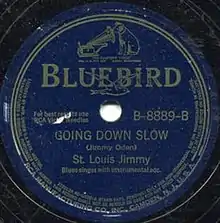Goin' Down Slow
"Goin' Down Slow" or "Going Down Slow" is a blues song composed by American blues singer St. Louis Jimmy Oden. It is considered a blues standard[1] and "one of the most famous blues of all".[2]
| "Going Down Slow" | |
|---|---|
 | |
| Single by St. Louis Jimmy | |
| A-side | "Monkey Face Blues" |
| Released | 1942 |
| Recorded | Chicago, November 11, 1941 |
| Genre | Blues |
| Length | 3:10 |
| Label | Bluebird |
| Songwriter(s) | James B. Oden a.k.a. St. Louis Jimmy |
"Goin' Down Slow" has been recorded by many blues and other artists, including a noteworthy version by Howlin' Wolf with narration by Willie Dixon. A rendition by Bobby Bland was a hit in both the Billboard Hot 100 and R&B charts.[3]
Original song
"Goin' Down Slow" "is the lament of a high roller who is dying":[1]
I have had my fun, if I never get well no more (2×)
Oh my health is fading on me, oh yes I'm goin' down slow
Please write my mama/mother, tell her the shape I'm in (2×)
Tell her to pray for me, forgive me for my sin
The song is a moderately slow-tempo twelve-bar blues, notated in 4
4 or common time in the key of B.[4][5] Oden, as St. Louis Jimmy, recorded it in Chicago on November 11, 1941. It was released as a single by Bluebird Records and featured Oden's vocal with accompaniment by Roosevelt Sykes on piano and Alfred Elkins on "imitation" bass.[6]
"Goin' Down Slow" was Oden's most famous song[7] and he later recorded several versions, including in 1955 for Parrot Records and in 1960 for Bluesville Records. He and Sykes continued their musical partnership well into the 1960s.
Howlin' Wolf version
Howlin' Wolf recorded "Goin' Down Slow" for Chess Records in 1961. Wolf (vocal and guitar) recorded the song as a Chicago blues, with Henry Gray (piano), Hubert Sumlin and Jimmy Rogers (guitars), Willie Dixon (bass), and Sam Lay (drums). Dixon also provided a spoken narrative, alternating with Wolf's vocal passages:
Now looka here, I did not say I was a millionaire
But I said I have spent more money than a millionaire
'Cause if I had'a kept all the money that I'd already spent
I would've been a millionaire a long time ago
And women? Great Googly-Moogly!
It was released in 1961 as a single between his "Little Red Rooster" and "I Ain't Superstitious" releases and included on his second compilation album Howlin' Wolf a.k.a. Rocking Chair Album in 1962. Wolf re-recorded the song in 1970 during The London Howlin' Wolf Sessions with Eric Clapton (guitar), Klaus Voorman (bass), Ringo Starr (drums), and Jeffery Carp (harmonica), which released as a bonus track in 2003.
Recognition and legacy
In 2002, St. Louis Jimmy Oden's "Goin' Down Slow" was inducted into the Blues Foundation Hall of Fame in the "Classics of Blues Recordings – Singles or Album Tracks" category.[8] Writing for AllMusic, critic Bill Dahl notes "Few blues songs have stood the test of time as enduringly as 'Goin' Down Slow'."[9] In 1974, a rendition by Bobby Bland was released as a single and reached the Billboard charts, peaking at number 17 (R&B) and number 69 (Hot 100).[3]
References
- Herzhaft, Gerard (1992). "Going Down Slow". Encyclopedia of the Blues. Fayetteville, Arkansas: University of Arkansas Press. p. 449. ISBN 1-55728-252-8.
- Demetre, Jacques; adapted by Waterhouse, Don (1994). The Prewar Blues Story (Media notes). Various Artists. Best of Blues Records. p. 25. Best of Blues 20.
- Whitburn, Joel (1988). Top R&B Singles 1942–1988. Menomonee Falls, Wisconsin: Record Research. p. 46. ISBN 0-89820-068-7.
- Hal Leonard (1995). The Blues. Milwaukee, Wisconsin: Hal Leonard. pp. 90–91. ISBN 0-79355-259-1.
- The original recording is in B♭.
- Usually a washtub bass or jug.
-
Shadwick, Keith (2007). The Encyclopedia of Jazz & Blues. London: Quantum Publishing. p. 368. ISBN 978-0-681-08644-9. Missing or empty
|title=(help) - Blues Foundation (November 10, 2016). "2002 Hall of Fame Inductees: Going Down Slow – St. Louis Jimmy Oden (Bluebird, 1941)". The Blues Foundation. Retrieved February 8, 2017.
- Dahl, Bill (1996). "St. Louis Jimmy Oden". In Erlewine, Michael (ed.). All Music Guide to the Blues. San Francisco: Miller Freeman Books. p. 204. ISBN 0-87930-424-3.